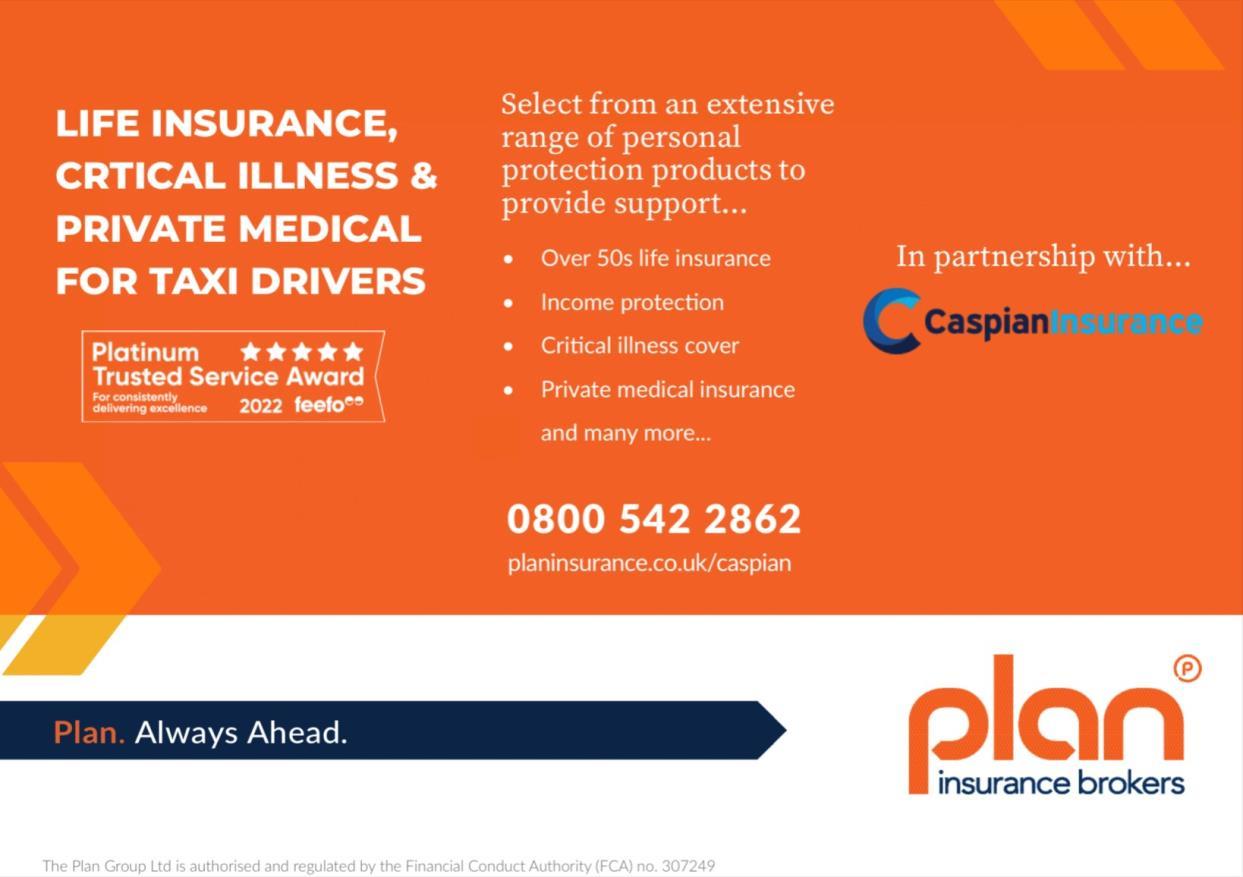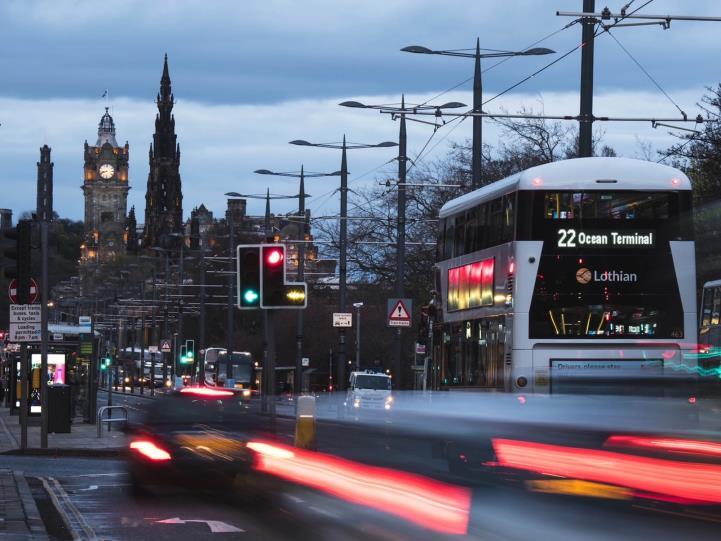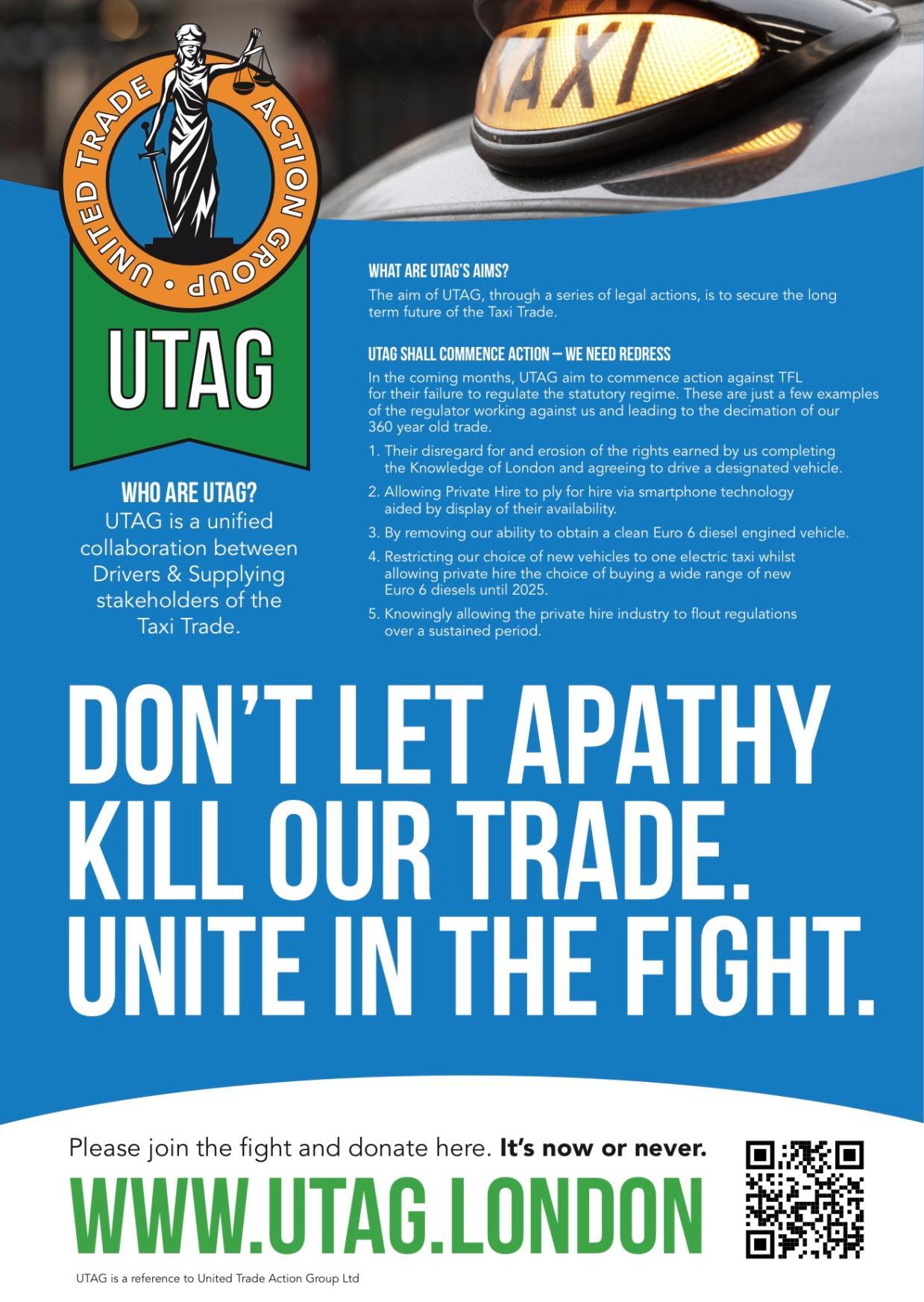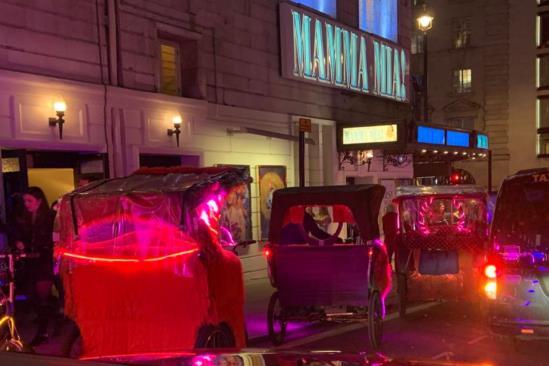



Edition 48 | APRIL 2023 OVER 4 MILLION MAGAZINE READS AND COUNTING... PLUS: CAB-E MEDIA, FUEL REPORT, RECORD TAXI JOURNEY, DVLA CHECKS, WELSH TAXI WHITE PAPER, UK TAXI NEWS AND MORE! Q&A THE UK’S #1 TAXI NEWS SOURCE LONDON’S LEADERS TALK TRADE IS THE KNOWLEDGE NOW BEYOND HELP?
MENTAL HEALTH ISSUES STAY HIDDEN FOR FEAR OF LOSING JOBS THE BIG SCOTTISH TAXI DEBATE DFT
TO TAXIPOINT LATEST EDITION
THE FEAR
TALKS
TaxiPoint Chief Editor:
Perry Richardson
TaxiPoint Publishing & Advertising Manager:
Lindsey Richardson
Visit us online at: www.taxi-point.co.uk

Write to us at: contact@taxi-point.co.uk

Advertising enquiries at:
advertising@taxi-point.co.uk
The publishers reserve the right to refuse, withdraw, amend or otherwise deal with all advertisements without explanation. All advertisers must comply with the British Code of Advertising practice.
The views expressed in this publication are not necessarily those of the publishers.
All written and image rights are reserved by the author as displayed. Reproduction in whole or in part without prior permission from the publisher is strictly prohibited.


Copyright brand TaxiPoint 2023. Creative Common image licenses displayed where applicable.
NEW MONTH FRESH LOOK
Hello and welcome to our April 2023 edition of TaxiPoint.
We’ve freshened up the look of the TaxiPoint magazine to give it an even more professional feel… we hope you like it!
Inside this edition there’s some great interviews and articles ranging from updates from the DfT to a very interesting Q&A session with London’s taxi representatives.
From an editorial point of view there’s a couple of pieces from myself on topics that really needed the airtime; the Knowledge of London and taxi driver mental
health. Read a little more about why both need revisiting and future support.
Whatever your position within the taxi industry, from CEO to driver, please take a second to share this edition with colleagues where you can. We want to help connect the UK taxi industry, but we do need your help.

We hope you enjoy this month’s offering and be lucky,
TaxiPoint Editor and Founder
2 | TAXIPOINT | APRIL 2023 | EDITION 48
FROM
THE
TAXIPOINT CHATS TRADE WITH THE DFT

The taxi industry is reaching -roads on so many levels, whether it be the shift to new cleaner vehicles or simply recovering from the devastating effect the pandemic
We got in contact with the Department for Transport (DfT) asking three questions focusing on how the department understands challenges facing the industry, how the DfT plans to assist cabbies facing high greener vehicle costs, and to understand s stance when it comes to cross border hiring
Cross border hiring has long been a hot topic in the industry. But s stance on the rule? A DfT spokesperson told Ensuring that all licensees and vehicles meet high, but proportionate, national standards and enhancing
enforcement powers so they can act against any licence will address key concerns on out-of-
The Government has committed to legislate for these when parliamentary time allows.”
The spokesperson was also keen to highlight that the DfT are aware of the multiple challenges facing the trade and said: “The DfT regularly engages with the taxi and private hire vehicle sector on a wide range of issues to enable the industry to deliver safe, accessible, available and affordable services for passengers.”
TaxiPoint pointed out that the cost of vehicles has skyrocketed over the last 12 months. Last month saw a new LEVC TX electric taxi finance package quoted to cost £100,000. We asked whether more could be done to assist taxi drivers to shift to cleaner electric taxis.
A DfT spokesperson said: “Government grants have been in place for over a decade to help reduce the up-front purchase price of zero emission vehicles. The Government’s Plug in Taxi grant scheme supports taxi firms and drivers to transition to zero emission vehicles.
“The scheme offers a discount on the price of eligible taxis of up to a maximum of £7,500 or £3,000, depending on the vehicle’s range, emissions and design.”

3 | TAXIPOINT | APRIL 2023 | EDITION 48 WWW.TAXI-POINT.CO.UK
“The Government has committed to legislate for these when parliamentary time allows.”

LONDON’S LEADERS THREE TAXI CHIEFS DEBATE FOUR BIG QUESTIONS
Q&A WITH
What would you say are the biggest challenges facing the London taxi industry right now?
Steve McNamara (LTDA): “Our biggest problem is maintaining and improving our access to the road network. The current ludicrous system whereby some boroughs give us access to LTNS and others don’t, where TfL give us access to all the Bus Lanes, some priority access such as London Bridge but then deny us the ability to use Bishopsgate, has to stop.
“We are easily identifiable, there is an easily accessible database of licensed taxis which Boroughs can use for ANPR enforcement. As an integral part of the public transport network, and the only one providing a fully accessible, door-to-door service, we should be able to access any and all restricted routes.”
STEVE MCNAMARA LTDA GENERAL SECRETARY

GRANT
DAVIS LCDC CHAIRMAN
PAUL
BOND RMT TAXI BRANCH CHAIRMAN
Grant Davis (LCDC): “When I say ‘many’ what I mean is that the whole landscape of the taxi trade is changing very fast, and we unfortunately do not have any say on how the changes impact us. If I were to list them, it would be LTN’s, PHV numbers, Knowledge of London (KOL) numbers, and finally the cost of our taxi.
“The licensed taxi trade in London has 2 bedrocks, the vehicle and the KOL and unfortunately for us, our regulator, TfL has failed us on a massive scale.”


Paul Bond (RMT): “For us the big challenge is TfL’s driver policy and an ever-decreasing profit margin. The trade is not given the respect it deserves with no recognition of the investment made, both in terms of time and money, to offer the service we do.”

5 | TAXIPOINT | APRIL 2023 | EDITION 48 WWW.TAXI-POINT.CO.UK
There’s been a long public battle with Uber and other ride-hail operators entering the London market. Would you say the playing field is now equal?
Steve: “The only advantage the ride hail companies ever had, in fact their USP, was that they were cheap, unsustainably and unrealistically cheap. As a result of the many regulatory burdens now required of them, (most of them designed to tackle the many safety issues and risks these operators presented to the public), they are no longer cheap.
“In fact, they are often more expensive than the equivalent taxi fare. As a result, their customers have deserted them. The requirement for all PHVs to be ZEC has massively reduced the choice of cheap cars available to PH, in many cases the cost of a car has doubled.
“All of these measures, coupled with our universal acceptance of contactless payments and the far superior service taxis provide, has meant we are now the first choice of many Londoners and visitors, a phenomenon being described by many as the ‘renaissance of the London Taxi’.”
Grant: “All of us in the licensed Hackney Carriage trade know only too well our battles with Uber, the Government and our regulator TfL.
“We realised the end game for Uber and others was for the taxi trade to die in London, but that never happened and we are seeing a resurgence of work for us (mainly due to the lack of taxis working).
“Recently the PH app BOLT has been asking taxi drivers to join up and will join the other apps in London offering a mixed fleet.”

Paul: “I don’t think it’s a case of level playing fields. We shouldn’t even be playing the same sport! We all know the history when it comes to the taxi industry and Uber. Whilst there have been some successes there is still a lot to do looking no further than defining what a pre-booked electric hail is.”

Should there be a cap on the number of private hire vehicle drivers licensed in the capital?
Steve: “Any cap on PH will need primary legislation, Boris, when he was Mayor wanted the power to cap numbers but never actually delivered when he had the opportunity as PM.
“The current Mayor has also supported calls for a cap. Many focus on the number of drivers, personally I would favour a much more realistic and enforceable cap on the number of vehicles, a minicab driver without a minicab is unemployed!”
Grant: “Every time the conversation for a cap on PH numbers is brought up at meetings with TfL, they run for cover. The PH representatives have a massive sway of power over TfL and because of this the PH agenda is always accepted by TfL.
“The question of can TfL cap numbers is always answered "no" by TfL, but this is a cop out.
“There is always more than one way to skin a cat and if TfL were to reintroduce the enhanced driving test and also the English language requirement, these two things alone would organically assist the number of PH drivers getting registered every month to slow down. We know for apps such as Uber they need a churn of drivers signing up on a regular basis to keep going and maybe these points have been made to our mayor when he meets Uber officials.
“With over 100,000 PH drivers licensed in London, how does TfL think anyone in both industries can earn a decent living?”
6 | TAXIPOINT | APRIL 2023 | EDITION 48 WWW.TAXI-POINT.CO.UK
Paul: “It all comes down to primary legislation. There just isn’t a will to push this agenda through at Government level so hands are very much tied. Do we need one yes, but will we get one anytime soon, no.”
The cost of financing the only new black cab available to drivers has just tipped over £100,000 in some cases. How are the costs impacting the industry and how can the trade adapt?

Steve: “The cost of our cab is a major concern, although much is made of the £100,000 figure, much of that is attributable to current high interest rates. I have seen others calling for the Conditions of Fitness to be reviewed or scrapped, according to these people this would give us access to cheaper vehicles, put simply it won’t!
“Even without the turning circle, which they say is not needed, any vehicle would have to be fully wheelchair accessible, all drivers would want to keep a partition and as with PH, it would have to be electric. This kind of conversion would put a minimum of £20,000 onto the base cost of a vehicle, more realistically £25,000. The cheapest possible donor vehicles start at about £43,000, the Vito at over £50,000, meaning the on the road price of any of them will be similar and more likely more
options anymore. To try to tackle this we at the LTDA have been working with a supplier to get a Euro V to Euro VI conversion approved, that will give back a 15-year age limit to these cabs and ensure a supply of older cabs going forward. Expect some news on this soon.”
Grant: “The situation we now face in London is a disgrace and needs to be urgently addressed if the taxi industry is to survive and flourish. When the ZEC taxis were first demanded by TfL, we were promised 5 vehicles, we now have just one taxi available, and the cost is increasing £1,500 every quarter.

“In London we are facing a shortage of taxis and what has happened is that due to the very high cost of both renting / buying a LEVC taxi, this has stopped older drivers, part time drivers and also Suburban drivers returning to the trade.

“And when you look at the mayor's new 12-year age limit, we will be losing around 1,000 taxis a year which is having a catastrophic impact on our numbers.”
Paul: “Removing features like the turning circle would do very little to bring down costs, but of course we need more vehicle choice.
The real problem is the financing of the vehicles. We need to re-engineer the financing model currently in place and look for interest free loans help similar to the help offered in Scotland. There is also a big case to drop VAT from public electric chargepoints and also dropping VAT from all wheelchair accessible taxi vehicles.”
that modern electric or hybrid vehicles are all expensive, there are, unfortunately, no cheap
7 | TAXIPOINT | APRIL 2023 | EDITION 48 WWW.TAXI-POINT.CO.UK

THE KNOWLEDGE THE REASONS WHY THE KNOWLEDGE MIGHT NOW BE BEYOND HELP
ARTICLE: PERRY RICHARDSON
It is now hard to argue that the Knowledge of London (KOL) is not only declining in interest and participation, but it’s also dwindling away with little hope of coming back.
And the sad part of this story… does anyone really care?
The KOL was seen as an achievement to be proud of and a qualification into a respected trade that offered a job for life should the cabbie wish to

trade. That has been slowly eroded away to the point where we now find ourselves.
WHERE HAS IT ALL GONE WRONG?
The start of the decline in KOL applicants dates to when electronic hailing systems arrived. The boundary between what was a booking and what was a hailing was quickly blurred. It created confusion for those looking to enter the plying-forhire market and provided an opportunity for those

9 | TAXIPOINT | APRIL 2023 | EDITION 48 WWW.TAXI-POINT.CO.UK
that would normally work off pre-determined bookings. The market was disrupted, drivers suffered.
An explosion in private hire vehicle (PHV) drivers ensued, saturating the market and making the job of a taxi driver unattractive, and for some in the trade, financially unviable. There were no caps on numbers introduced to safeguard taxis which offer 100% wheelchair accessible cabs. A decade on and there is still no cap on numbers.
Publicly hailed taxis were then demoted to a similar status as delivery vans and private vehicles. Road space was lost, and this trend has continued rapidly for years. This has created doubt among those looking at the taxi trade as a prospective career and brought questions about whether London’s transport authorities actually see
the service as a solution to inclusive public transport mobility.
Taxi tariffs have been stifled, slowly reducing the earning power of cabbies. Multiple tariffs frozen and below-inflation tariff changes, not always reviewed annually, has made the job less appealing to new entrants and pushed others out to higher paid employment. The number of licensed taxi drivers has continued to drop steadily. In 2015 there were 25,891 taxi drivers in London. Now, that figure stands at just 18,391 and will continue falling fast due to inaction.

Expensive vehicles and rising costs are a huge problem off the back of the global pandemic where the industry was brought to its knees. The industry is still catching up on lost revenue during that period, but now inflation and interest rates have pushed the only vehicle available to buy through the £100,000 mark if purchased on finance and a low deposit. TfL could have supported the

10 | TAXIPOINT | APRIL 2023 | EDITION 48 WWW.TAXI-POINT.CO.UK
A DECADE ON AND THERE IS STILL NO CAP ON NUMBERS.
industry by bringing in a new tariff that matched the increase in costs… but instead opted for a belowinflation tariff meaning cabbies will be at least another 4% out of pocket this year. After training hard at their own expense for upwards of three years, applicants then run the risk of losing that licence to work in the very first day of working if they accumulate points on their licence, but ridiculously are still able to then apply to work for a London bus company. The risk of losing a licence is too great now for the commitment each KOL application gives to the capital to serve it. Lastly, and this is becoming even more prevalent when considering doing the KOL, how will the introduction of autonomous vehicles impact an industry that is already declining in numbers? No one knows the time scales involved or just how ‘autonomous’ a vehicle can be in a bustling London city with people, bikes and scooters flying in all directions. But what it does do is create doubt for
those looking to enter the trade. No one has considered or explored what would happen to 300,000 taxi and PHV drivers across the UK. What would happen to their licences, plying-for-hire and disabled mobility?


A review into the KOL has been ongoing and findings were set for release last year. There is however still no further news on this.
Changes were needed years ago. Any changes brought in today would take years to filter through given the length of time to train KOL applicants. Dumbing down the KOL to fast-track drivers would devalue the qualification already obtained by drivers. But the problem isn’t the KOL test. If the job was worthwhile people would invest time and money to reach the standard required.
Can the Mayor of London and TfL find a way to make the job, not the KOL, more attractive and worthwhile? The last decade of decline would have many believe not.
11 | TAXIPOINT | APRIL 2023 | EDITION 48 WWW.TAXI-POINT.CO.UK
CAB-E MEDIA: THE NEW TAXI MEDIA FIRM LOOKING TO ‘CABTIVATE’ AUDIENCES

THERE ARE TWO OF YOU BEHIND CAB-E MEDIA. CAN YOU PROVIDE SOME BACKGROUND ON YOURSELVES AND HOW YOU BOTH FIRST CROSSED PATHS?
Jayne Alexander: “I am Managing Director of a Mayfair-based media agency called Dovetail which is a respected communications agency with media and marketing expertise in travel, hospitality, real estate, restaurants, chefs, luxury goods and wellness. Before setting up Dovetail, I worked as Marketing Director for The Virgin Group.
“I met Jack at a time when I was researching a taxi advertising campaign for a client. I just so happened to hail down his cab and we started talking about business, with Jack giving me an insight into how the business works. We then decided to join forces.”
Jack Dredge: “I am a London cab driver and former owner of a Knowledge of London School. Together, Jayne and I have an extensive network across the black cab community as well as internationally amongst luxury travel and lifestyle brands. We both recognise the potential and power of branded black cabs in London.

“After a few meetings and some interesting ideas we used a play on words including the term ‘cabbie‘, the electric cab, combining with ‘Media’. The brand CAB-E Media was launched to ‘cabtivate’ brands in London - bringing your brand to the hailing hand, being our strapline.”
WHAT MAKES CAB-E MEDIA DIFFERENT TO OTHERS ALREADY ON THE MARKET?
Jack: “Our all-electric fleet of black cab model has been developed as a fair-trade model and ownerdrivers benefit from a working partnership based on
12 | TAXIPOINT | APRIL 2023 | EDITION 48 WWW.TAXI-POINT.CO.UK
IMAGE CREDIT: CAB-E MEDIA
JACK DREDGE CAB-E MEDIA CO-FOUNDER

transparency. Our business model is designed to support the London cabbie and an industry that has thrived in London since 1662. Our objective is to help build and strengthen the trade which has been impacted by the pandemic in recent years - helping the drivers to earn additional income from their vehicles having seen an increase in expense with the new LEVC taxis costing around 30% more than the diesel predecessor.
“We support the industry with membership to various trade organisations and actively campaign for one of the longest established professions in London - working with luxury brands to deliver a powerful above the line platform.”
Jayne: “We choose to work with luxury brands where the design is important to both the client and the driver. Very importantly the driver needs to be proud of the partnership. Our focus is on high quality vinyl printing and installation with a recyclable policy, an impactful call to action and creative content creation for social media activity.”
WHAT MAKES THE BLACK CAB SUCH AN ATTRACTIVE BILLBOARD FOR ADVERTISERS?
Jayne: “Increased visitor numbers to the city of London mean that brands are overhauling their advertising and marketing strategies in favour of physical advertising as an alternative to the oversaturated and competitive digital space. As a result, London’s Black Cab drivers have seen a resurgence, giving brands a cost-efficient and effective advertising medium.”
Jack: “Black cabs are seen as an icon of London and both locals, as well as international visitors, have a trust and respect for their black cab driver with a

knowledge unmatched by any other professional driver in the world. A fleet of all electric black cabs provide creative advertising concepts with fully wrapped livery, interactive QR codes, a backdrop to launch events, VIP, media and influencer transportation.”

Jayne: “They are also the most costeffective for advertisers - a digital billboard advert in central London is extremely expensive with some of the cheaper options in quieter streets running from as much as £200 per day for a proportion of coverage whereas a CAB-E media campaign provides a mobile billboard in the most affluent areas of London including the city of London where billboards are usually unattainable for as little as £14 per day - making CAB-E Media a serious operator of OOH space in the world’s most exciting city.”
WHAT ARE YOUR SHORT AND LONG-TERM PLANS? ARE THERE ANY FUTURE PLANS TO EXPAND OUTSIDE OF LONDON?
Jack: “We are currently investing in the expansion of our electric cab fleet which will provide safe, reliable, and sustainable transport in London with drivers who are part of our business and as such are valued members of CAB-E Media.”
Jayne: “We are developing our agency relationships and direct client base.”
Jack: “Long term, we plan to build our international profile and grow into other cities – we already have fleets in other destinations in the UK and just this week, we received an interesting enquiry for a transatlantic campaign in London and New York.”
14 | TAXIPOINT | APRIL 2023 | EDITION 48 WWW.TAXI-POINT.CO.UK
JAYNE ALEXANDER CAB-E MEDIA CO-FOUNDER
IMAGE CREDIT: CAB-E MEDIA

THE FEAR: TAXI DRIVERS KEEP MENTAL HEALTH PROBLEMS HIDDEN DUE TO JOB LOSS FEARS
The way we all approach mental health has improved in recent years. It is talked about more openly and there is more of an understanding and less taboo. Ultimately, most acknowledge that it’s okay to not feel great all the time.
However, in some communities and industries, there is still a stigma attached to anxiety, depression or other mental health issues which means people keep them hidden away due to added fear that they could lose their livelihood if they seek help.
Those working as taxi drivers can very much count themselves in this category.
It is widely regarded that one in four adults in the United Kingdom suffers from at least one mental health illness in any given year. This is equivalent to 25% of the population, or in this case, a quarter of all taxi and private hire vehicle (PHV) drivers.

According to a report by Mind, approximately only 1 in 3 adults with a common mental health problem are currently getting treatment in the form of talking therapies, medication, or both.

16 | TAXIPOINT | APRIL 2023 | EDITION 48 WWW.TAXI-POINT.CO.UK
ONLY 1 IN 3 ADULTS WITH A COMMON MENTAL HEALTH PROBLEM ARE CURRENTLY GETTING TREATMENT
The most common treatment offered is psychiatric medication.

It is estimated that 75% of people with mental health problems in England may not get access to the treatment they need.
With the taxi industry in mind, that equates to over 82,000 cabbies across the UK likely to have experienced mental health issues in the last 12 months.
WHAT STOPS TAXI DRIVERS GETTING HELP?
There is one overriding fear that stops cabbies in their tracks. The fear of losing their job.
If a taxi driver visits their GP or another NHS professional for help it is likely to appear on their medical record. The driver may then need to contact DVLA and their licensing authority and notify them of the condition and the treatment prescribed should the GP see necessary.

This fear understandably stops drivers seeking help. How would they know the severity of their issues before diagnosis, so why would anyone risk not only their job, but in lots of cases the financial welfare of his or her family?
The job itself, working long hours alone, sitting down all day, poor eating habits, late nights, high overheads, stress of driving, and the list can carry on, are all triggers.
With professional help often off the cards, taxi drivers have set up self-help WhatsApp groups. Drivers talk to other likeminded cabbies about the stresses and pressures they feel and how they try to cope with similar anxieties and depression. But it’s not professional help and the wrong advice can just fuel problems further in some cases.
Many licensing authorises put out what can only be described as token gestures. These gestures usually include information on mental health charities, visit your GP and generic advice on managing triggers. But, authorities know full well that drivers won’t get the help they need because of policies put in place by them and the DVLA Group 2 criteria usually set for cabbies.
Taxi drivers are quite simply not getting the help they deserve.
17 | TAXIPOINT | APRIL 2023 | EDITION 48 WWW.TAXI-POINT.CO.UK
THERE IS ONE OVERRIDING FEAR THAT STOPS CABBIES IN THEIR TRACKS. THE FEAR OF LOSING THEIR JOB.
SCOTTISH PARLIAMENT DISCUSSES HOW TO BEST SUPPORT THE TAXI INDUSTRY


Late March saw a much welcomed and debate in Scottish Parliament on how best to support taxi drivers and how to mitigate the ‘devastating impact’ the Low Emissions Zone (LEZ) in Glasgow could have on the taxi industry.
It was also noted that now was the ‘time to stand up for taxi drivers across the country’ and that Parliament ‘cannot let Glasgow’s accessible black cab trade die’.
The motion debated on 23 March was introduced by Liam McArthur MSP, who said: “That the Parliament recognises the contribution that taxi drivers make to the economy, connectivity and cultural life of Glasgow and the Greater Glasgow region; believes that taxi drivers provide a vital service to people who have mobility problems that make other forms of public transport unsuitable; understands that the service that taxi drivers provide does much to support what it sees as
Glasgow’s important night-time economy and hospitality industry, as well as provide the transport options which contribute to making Glasgow a UNESCO World City of Music; recognises the longstanding charity work carried out by Glasgow’s taxi drivers through events such the Glasgow Taxi Outing To Troon; considers that recent years have brought unprecedented challenges to taxi drivers, with the COVID-19 pandemic reducing passenger numbers, and significant regulation changes from Glasgow City Council mandating vehicle changes which, it believes, are unaffordable to many within the industry; notes the campaign from some taxi drivers for a fair implementation of new regulations, and congratulates the sector for all it contributes to the city.”
Next up following the introduction was Labour MSP Pauline McNeill who brought forward the members’ business debate supporting taxi drivers in the region. McNeill said: “I do not apologise for
18 | TAXIPOINT | APRIL 2023 | EDITION 48 WWW.TAXI-POINT.CO.UK
SCOTTISH TAXI INDUSTRY DEBATE
people back down to earth, though, and I thank members for staying, because it is time to stand up for taxi drivers across the country. Taxis are a vital part of our public transport system. In fact, the taxi sector has become more vital in recent years, due to unreliable train and bus services, which I hope will get better over the years.
“This is my first members’ business debate in this session, and I chose to make it about the plight of taxi drivers because the industry needs our focus and immediate action. I, along with many Scottish Labour colleagues, will speak today about our clear support and our demands for the sector. Today, as a Glasgow member, I stand in support of Glasgow taxi drivers, in particular, in order to highlight the contribution that they make to the city’s economy, connectivity and cultural life. As I have said, they play a vital role in our public transport system by plugging the gaps that are left by our unreliable train and bus services and by covering times of the day when other forms of transport are not running.
“I worked with taxi drivers in the previous parliamentary session and have, like many other members, been working with them during this session, too, in lobbying Glasgow City Council and the current Cabinet Secretary for Finance and the Economy, Kate Forbes, on their behalf.


“I believe that they were neglected throughout the pandemic and are being neglected now, with their concerns about the low emission zone that is being introduced in Glasgow I cannot speak for other cities being ignored so far.
“Glasgow taxi drivers have said that they support the principle of LEZs; all that they have asked for is a short delay of a year to give them time to comply with the scheme. Even if that happens, it will not be enough time for many. Black cabs, in particular, have been an iconic feature of Glasgow city centre, and I do not understand why any city administration would, seemingly, go out of its way to ignore that important fact.
19 | TAXIPOINT | APRIL 2023 | EDITION 48 WWW.TAXI-POINT.CO.UK
SCOTTISH TAXI INDUSTRY DEBATE
“As we know, around 1,000 cabs out of the fleet of 1,420 are not Euro 6 compliant. In other words, there are 1,000 taxi drivers who, at the moment, would not be able to enter the LEZ in Glasgow. One can already begin to see the extent of the problem. Although 200 cabs have been given an extra 12 months, people in the rest of the taxi sector have been left to find thousands of pounds that they simply do not have during a cost of living crisis.
“The worry, therefore, is that many will just leave the trade and will not be replaced. With the high cost of a new electric vehicle, at approximately £60,000, and the average age of a cab driver being nearly 60 years old believe it or not the finance option for a new vehicle is, for many, not a viable solution.
“Due to global supply chain shortages, the secondhand market is sparse, too, which means a significant lack of options for compliance. As we can see, there are layers upon layers of problems. The LEZ will have a devastating impact on traders, taxi drivers and low-income and older drivers who are unable to buy new cars.”
SNP’s David Torrance was sympathetic to the financial pressure facing taxi drivers, but was keen to highlight a lack of support offered by the UK Government when it came to available funds. Torrance said: “As the motion recognises, support for taxi drivers is not just a transportation issue, but is of cultural, social, economic and environmental concern, so I welcome the Scottish Government’s cross-sectoral approach in treating it as such. For example, I am proud of the Scottish Government’s ambitious plans to prioritise the just transition to net zero by making low emission zone retrofit grants available to taxi drivers to support their shift to lower emissions and greener vehicles. I acknowledge that it has been difficult for taxi drivers in Glasgow to do that. The Citizen Participation and Public Petitions Committee has seen evidence from the taxi sector about potential challenges that low emission zones might present to
taxi drivers, so I am reassured to know that our Minister for Transport is working closely with taxi driver representatives and unions to discuss the matter further.

“Fife is one of the most heavily populated local authorities in Scotland, and although we benefit from a range of rail and bus services, taxis are an essential part of our transport chain. They contribute significantly to access to Fife’s array of hospitality, tourism, nightlife, manufacturing industries and outdoor activities. With the summer season on its way, it is essential that taxi drivers feel supported and valued as major players in our local economy, as they are in Glasgow, too.
“
I am sympathetic in respect of the financial pressures that are facing taxi drivers. We cannot ignore the glaring and obvious pitfalls of the UK Government’s recent spring budget. Households across the country, including those of taxi drivers, are facing the biggest fall in living standards on record, and families are seeing their incomes being devastated by the cost of living crisis.
“I am confident that the Scottish Government is using its limited powers and resources to address that cost of living crisis. Although the Chancellor of the Exchequer’s increased funding to the Scottish Government is welcome, it is nowhere near adequate to deal with the significant fiscal challenges that the Scottish Government and Scottish local authorities are facing as a direct result of the economic chaos that has been caused by Westminster. I know that it will be a huge disappointment to the taxi industry, but the chancellor missed a vital opportunity to give real support and to grant the Scottish Government the necessary levers to provide taxi drivers with meaningful support.”
Labour’s Pam Duncan-Glancy MSP next took centre stage in the debate, describing the vital importance taxis provide disabled people and wheelchair users like herself.
20 | TAXIPOINT | APRIL 2023 | EDITION 48 WWW.TAXI-POINT.CO.UK
SCOTTISH TAXI INDUSTRY DEBATE
The MSP said: “I will use my time to talk about how important taxis are to me and other disabled people. Most types of public transport in Glasgow simply are not accessible to me, as a disabled woman. I cannot use the subway because most of the platforms have steps and no lifts, and even where I could get to the platform, the trains are not accessible for wheelchair users. Buses have a onewheelchair rule, which means that I cannot travel on a bus if a wheelchair user or a pram is already on board, and I cannot travel on buses with my partner, who is also a wheelchair user. I told members this story earlier this month. It not only hampers my ability to get around; it is dangerous. I also told members of the experience that I had when I had to travel on my own at night and was followed home.
“Not even ambulances are fully accessible in the city of Glasgow. When I fell last year, there was no space in the ambulance for me to take my wheelchair with me or for my husband to come. It was taxis that stepped up. This is a crucial issue for disabled people and women, as I will come on to.
“I am not alone. Research carried out by Transport Scotland shows that disabled people are less likely to have a driving licence than non-disabled people and less likely to have a car available to their household than non-disabled people. Accessible public transport is vital in ensuring that we can travel around freely and participate in society as our peers do, but we are not there yet.
“For most disabled people me included taxis are by far the easiest and most accessible form of public transport available.

“Disabled people make twice as many taxi journeys a year as nondisabled people. Right across the region, Glasgow black cabs help disabled people to get to school, go to work, see friends and access

hospital appointments. As I said, they even provide an emergency service.
“Taxis are key not only to disabled people; they also provide a safe form of transport for many others, including women, particularly when travelling home at night. They are fundamental to so many people, which is why I am deeply concerned about the impact that the low-emission zone in Glasgow will have on the trade. We are already seeing problems.”
Duncan-Glancy added: “Although I support action to address climate change, including the creation of low-emission zones, our transition to net zero must be just, and to be just, the transition must protect jobs and equality. As it stands, the implementation of the low-emission zone in Glasgow will fall far short of that standard.
“I first met representatives of the Glasgow cab section of Unite in February 2022 after it had launched its campaign to stop the black cab blackout the previous weekend. Not long after that, I met Glasgow Taxis, the largest supplier of licensed taxis in Glasgow, which has an entirely wheelchairaccessible fleet. They all told me the same thing: without urgent action, the low-emission zone will be devastating for the public, the taxi trade and drivers in Glasgow. My colleague Pauline McNeill has set out in detail the stark reality that those drivers face.
21 | TAXIPOINT | APRIL 2023 | EDITION 48 WWW.TAXI-POINT.CO.UK SCOTTISH
TAXI INDUSTRY DEBATE
“Taxis are key not only to disabled people; they also provide a safe form of transport for many others, including women, particularly when travelling home at night.” PAM DUNCAN-GLANCY MSP
“We are in a cost of living crisis. Many drivers are already struggling to make ends meet, as we have heard in the debate. Without action from the Government, they will not be able to afford to meet the requirements, and funding is not the only factor. As we have heard, a decline in the supply of parts is also affecting the industry and delaying retrofitting work.
“Other local authorities such as Edinburgh and Aberdeen have recognised how hard this is for the taxi trade and have rightly delayed the implementation of their low-emission zones until 2024. However, Glasgow City Council is refusing to do that for many taxi drivers. Drivers are not opposed to action to tackle emissions; they are simply asking for more time and financial help so that they have a fair chance of meeting the requirements of the low-emission zone.
“There is already a significant problem with job losses and unemployment in Glasgow. What thought has been given to drivers for whom, in many cases, reskilling is simply not an option? What are they to do? What are disabled people, women and everybody else who relies so heavily on taxis meant to do when so many taxis go off the road?
“Since the moment that I learned about the devastating impact that Glasgow’s low-emission zone could have on the black cab trade, I have not stopped fighting to save them. We cannot let Glasgow’s accessible black cab trade die, we cannot leave thousands of drivers without jobs and we cannot leave women and disabled people without safe and accessible transport. Will the minister please set out how she will take action to give Glasgow’s black cab trade a fighting chance of survival?”
Conservative Graham Simpson MSP echoed much of the support, but also highlighted second-hand supply problems facing the trade.
Simpson MSP said: “Glasgow City Council knows the issues and should understand the trade. I will explain the black cab trade to you, Deputy Presiding
Officer. In Glasgow in fact, across Scotland our taxi drivers tend to buy second-hand vehicles, many of which come from the London market, so they have to wait for those vehicles to appear in the second-hand market. They are asking for extra time because those vehicles are just not in that market yet.”
Paul Sweeney MSP, whose father is a working taxi driver in Glasgow, joined the debate.
Sweeney MSP said: “I know that taxi drivers are not luddites. They are not anti-environmental improvement. They want to go with the grain, but they need to be given a fair deal in the way that bus companies have been given a fair deal to renew their fleets with substantial and generous public subsidies along with their large capital-raising capacity.
“Taxi drivers, who are often self-employed, often do not have the means to raise capital and are at a point in their lives where they cannot get that kind of finance, so they need extra support from the Government. If they do not get that, the public good that taxis provide which colleagues across the chamber have so eloquently described, whether it be the educational aspect, disability access or support for our night-time economy will suffer. Indeed, we will all suffer, because we all have skin in the game with regard to having a thriving taxi industry.”

Jenny Gilruth, MSP and Scottish Government Minister for Transport, listened to the whole debate and concerns raised across parties.
Gilruth responded: “As we heard earlier, exactly three years ago today, the country entered a national lockdown. “Stay at home” was the mantra for us all; saving lives was the imperative. As we have heard today, lockdown restrictions cut us off from family and friends, but they also necessitated certain businesses stopping trading cafes and shops ceased to trade. Indeed, the Scottish economy contracted by 20 per cent during the first few months of lockdown. The Scottish Government
22 | TAXIPOINT | APRIL 2023 | EDITION 48 WWW.TAXI-POINT.CO.UK SCOTTISH
TAXI INDUSTRY DEBATE
provided support and made available around £4.4 billion domestic rates relief. That helped to it was a lifeline.
However, as we have heard from Pauline McNeill and others today, it was a really challenging time for our taxi

We also know, as we heard from members, that demand for taxi services plummeted during the pandemic. Operators reported an 80 per cent drop in bookings and many drivers chose to leave the profession, as we heard from Mr Sweeney. Those who stayed in the profession reported huge reductions in

The Scottish Government provided specific funding to the taxi trade through the taxi and private hire driver support fund and latterly through the taxi and private hire vehicle driver and operator support fund. However, as we heard from Pauline McNeill, the importance of the time economy, particularly during our recovery from the pandemic, cannot be overstated.”
As I have put on the record, I have previously met the Scottish Trades Union Congress and Unite. At the end of last year, I also met the Scottish Private Hire Association to talk about this issue and others more broadly. The sector faces a number of
We heard from David Torrance about some of the challenges in relation to driver shortages, which have been exacerbated to some extent by Brexit. As I mentioned, it is also true to say that some have simply chosen to walk away from the trade completely.
I want to mention the importance of having properly licensed taxis. As I think we heard from Graham Simpson and others, women and minorities often depend on our jumped in at that point to add: “Before you move on to that, I want to highlight something that Paul Sweeney talked about. It is a good point that has also been made to me in conversation. Do you have any I wish you well in it in the to talk about how local authorities such as
23 | TAXIPOINT | APRIL 2023 | EDITION 48 WWW.TAXI-POINT.CO.UK
Glasgow could sit down with companies in other parts of the sector and bring them together a bit more?
“I have called for a new deal for taxi drivers. Part of the issue is that Glasgow was the most locked-down city, and the city is obviously not returning to what it was. I know that you are talking to lots of people, minister. That suggests to me that perhaps you could encourage authorities such as Glasgow to make a deal encompassing companies that can bring something to the table.”
The Minister for Transport responded: “I am more than happy to consider the member’s suggestion. In relation to licensing, I have been in discussions with officials on that point this morning. Of course, responsibility for licensing sits with another minister in the Scottish Government, but I think that there is a requirement for more commonality in respect of how the system is administered across local authorities to ensure that there is more of a level playing field. If that is the point that the member was alluding to, I recognise it very much.”
Sweeney said: “To develop the point about taxi renewal and a product being available, the switchedon taxis loan scheme is not attractive to older drivers, for the reasons that I mentioned in my speech, but perhaps work could be done with manufacturers such as Allied Vehicles to develop a personal contract purchase scheme or a patient leasing scheme that might be attractive to drivers. That might allow drivers to transition without the huge up-front capital cost of buying a vehicle, which is currently £60,000 to £100,000.”
Gilruth said: “The member makes an important and valid point. I will not give him a commitment on the record today, for reasons that he will well understand. However, there is a persuasive argument in relation to how that could be administered in future. As we heard from David Torrance, irrespective of who holds this position next week, Transport Scotland will continue to engage with the Transport Minister on the matter,
and directly with local authorities, because it is an on-going challenge.
“Pam Duncan-Glancy spoke of some of the challenges with accessibility on our wider public transport network. She will know that I am very live to those issues through the wider work that we are undertaking in relation to women’s safety. However, there is a huge challenge there, and of course taxis play a vital role in relation to accessibility. Irrespective of who holds this post in future, the Government will need to do more on that matter.”
Gilruth added: “We have spoken at great length about some of the specifics in relation to Glasgow City Council. Obviously, the decisions are for Glasgow City Council but, as minister, I put on the record that I have discussed the matter with the council, most recently only two weeks ago, I think.
“Glasgow City Council is responsible for granting exceptions. As I think I have discussed with Pam Duncan-Glancy in a previous parliamentary exchange, there is a specific challenge in Glasgow because of the age of the current fleet, which is much older than the fleets in other parts of the country. That is, in part, due to the council’s licensing conditions historically having been more lax than those in other parts of the country.”
Duncan-Glancy asked one last question: “On that basis, does the minister agree that there is a case to be made that Glasgow should delay the implementation of the low-emission zone for taxi drivers so that measures such as those that my colleagues Paul Sweeney, Pauline McNeill and others have suggested can be put in place?”
Gilruth concluded: “Obviously, that is a matter for the city council, but I hear the member’s point.
“It is, of course, for Glasgow City Council to outline its position, but I recognise that taxi operators and the unions have been engaging with the local authority. Very recently, Glasgow has confirmed that there will be an additional year for drivers whose taxis cannot be retrofitted, and the position for

24 | TAXIPOINT | APRIL 2023 | EDITION 48 WWW.TAXI-POINT.CO.UK SCOTTISH
TAXI INDUSTRY DEBATE
others is simply a requirement to demonstrate that they have signed up to the process of applying for funding. I understand that guidance is about to be issued on that early next week. Of course, that is a matter for Glasgow City Council. I certainly discussed the matter that the member has raised with the unions only last week.
“We have discussed at length some of the issues in relation to the importance of low recognise members’ views, particularly in relation to the challenges that are being experienced in Glasgow. As Transport Minister, I commit to work with our trade unions and the city council to reach a resolution. I recognise that the city council is taking action.
“The taxi trade plays a vital role in Scotland it gets people from A to B; it protects vulnerable passengers, as we have heard; and it provides mobility to those who otherwise might not be able to access key services. The Government has

through the roll-out of low-emission zones. We will continue that important work, and we will continue to support the taxi and private hire trade, which makes a vital contribution to Scottish society. We will continue to support the sector as best we can.”

25 | TAXIPOINT | APRIL 2023 | EDITION 48 SCOTTISH TAXI INDUSTRY DEBATE
£79,006.80 ON THE METER: THE LONGEST RECORDED TAXI JOURNEY

Have you ever wondered what the longest taxi ride recorded in the UK is? Well, you might be surprised to learn that it was not just a trip across London, but a journey around the world!

That's right, three friends from England decided to take a 20-year-old black cab named Hannah on an epic adventure that lasted 15 months and covered 43,319.5 miles (69,716.12 km) across four continents and 50 countries. They broke the Guinness World Records for the longest ever journey by taxi and the highest altitude ever reached by taxi.
The trio, Paul Archer, Johno Ellison and Leigh Purnell, started their journey in Covent Garden, London, in February 2011 and finished at the same point in May 2012. Along the way, they faced many
challenges and dangers, such as being arrested in Moscow, detained by the Iranian Secret Police, deported from Iran as suspected spies, stuck on the border of Moldova and driving through war zones in Pakistan and Afghanistan.
They also had some amazing experiences, such as seeing the Northern Lights in Finland, passing Mount Everest in the Himalayas, visiting the Taj Mahal in India, driving along Route 66 in the USA and meeting celebrities like Boris Johnson and Ranulph Fiennes.
The friends said they did it for fun and to raise money for the British Red Cross. They collected £20,000 for the charity and paid £79,006.80 on the meter.
26 | TAXIPOINT | APRIL 2023 | EDITION 48 WWW.TAXI-POINT.CO.UK

The wholesale price of diesel is now on a par with petrol yet diesel is still being sold for 17.5p a litre more on average at forecourts across the UK, data from RAC Fuel Watch reveals.
The average price of petrol stands at 146.63p while diesel is 164.26p despite both fuels selling for around 114.5p on the wholesale market. In fact, on two days at the end of March, wholesale diesel was cheaper than petrol.
Since the start of March the average weekly wholesale price of diesel has fallen 5p a litre while unleaded has
remained the same (diesel – 119p to 114.5p; petrol 114.6p to 114.7p).

RAC fuel spokesman Simon Williams said: “The forecourt price disparity between petrol and diesel across the UK is absolutely shocking given their wholesale prices are now virtually identical.
“At the beginning of March wholesale diesel was only 6p more expensive than petrol yet there was a 20p a litre gap between both fuels on the forecourt. Now the two fuels are identical on the wholesale market, and there’s still more than 17p difference at the pump.
“For retailers to be taking a margin of nearly 20p a litre on average throughout March, compared to the long-term average of 7p, is devastating for every driver and business that relies on diesel.”

28 | TAXIPOINT | APRIL 2023 | EDITION 48 WWW.TAXI-POINT.CO.UK

SHOULD TAXI AND PHV DRIVERS BE SUBJECT TO MORE REGULAR DVLA CHECKS?
ARTICLE BY:
Plans to introduce bi-annual licence checks for taxi and private hire (PH) drivers in Walsall have been scrapped by councillors who deemed the action "excessive".


The council requested a report by the Licensing and Safety Committee back in December 2022 to consider the introduction of more frequent checks. They are currently done every three years.
The report was prompted after a handful of licensed drivers in Walsall failed to inform the licensing authority of points endorsed on their licence.
However, councillors were keen not to punish the majority of drivers who are compliant with the current rules. They felt it was unfair to cause an increase in costs and red-tape based on a couple of cases of non-compliance.
Councillors also feared that more checks could push drivers to nearby Wolverhampton for cheaper and easier licensing.
While some have criticized the decision, councillors argued that the actions of a few drivers should not lead to all drivers being penalised.
Whilst going from 3-yearly to 6-monthly would clearly have been a huge leap in the amount of
DVLA licence checks being conducted, it does prompt questions over whether it would it be better for drivers to have more regular checks.
PROPORTIONATE LICENSING
Licensing authorities require all the information they need to make safe decisions. It is undeniable that regular licence checks give licensing authorities a better understanding of their licensees. And, as all the guidance states:

“The primary and overriding objective of licensing must be to protect the public.”
So, it is understandable why some licensing authorities have considered implementing more regular licence checks as part of their rules.
30 | TAXIPOINT | APRIL 2023 | EDITION 48 WWW.TAXI-POINT.CO.UK
But could more regular DVLA Checks create restrictive conditions for drivers?
The consultation version of the new Best Practice Guidance makes it clear that overly restrictive licensing conditions are harmful to both the industry and the public. It's not hard to see how extra licence checks could contribute to restrictive licensing.
However, if used proportionally, more regular checks could have a place.
Rather than having an arbitrary rule for all drivers, only make them a licensing condition when relevant. For example, if a driver has 6 points on their licence, it makes sense to carry out a bi-annual licence check. This ensures a licensing policy can be both flexible and proportionate.
REGULAR LICENCE CHECKS
Regular licence checks are a standard part of any professional driving role. Best practice advice is for employers to carry out these checks once a year. But the actual frequency of checks can vary wildly

The experts at Davis Licence Check, advise that DVLA Checks for any professional driver should be completed every 6 months. They advise more frequent checking depending on a driver’s risk profile:
0-3 points: Normal risk profile – bi-annually
4-7 points: Medium risk – quarterly
8+ points: Maximum risk – monthly.
This fits with the general advice within the driving industry that more regular checks should be implemented in certain conditions. These could include:
• Drivers with existing points on their licence

• Health conditions
• Driver age.
Jumping to 6-monthly licence checks would have been a big change for drivers in Walsall. It would have no doubt caused extra costs for drivers and plenty of complaints for the licensing authority. But there is definitely a place for extra licence
31 | TAXIPOINT | APRIL 2023 | EDITION 48 WWW.TAXI-POINT.CO.UK
SHAKE-UP PLANS TO MODERNISE TAXI AND PHV SERVICES IN WALES RELEASED IN NEW GOVERNMENT WHITE PAPER
Plans to modernise taxi services across Wales have been outlined in a white paper on the Taxi and Private Hire Vehicle (Wales) Bill published by the Welsh Government.


The proposals will deliver on a Programme for Government commitment to modernise the taxi and private hire vehicle sector and are intended to make services safer, greener and fairer.
Taxis and PHVs play a vital role in making public transport a more practical choice by providing people with connections for the first and last mile of journeys
as well as alternatives when other transport services are either not available or not operating.
However, following extensive engagement with the industry and key stakeholders on issues facing the sector, the subject of inconsistent services was a recurring theme. The proposals aim to level the playing field by introducing national minimum standards which will deliver better, safer, more consistent services across Wales.
The proposed standards include mandatory training for drivers to ensure they have the knowledge and
32 | TAXIPOINT | APRIL 2023 | EDITION 48 WWW.TAXI-POINT.CO.UK
IMAGE CREDIT: WELSH GOVERNMENT
LEE WATERS
WELSH NEWS
“The sector has changed rapidly in recent years, and quite simply the legislative framework has not kept up with the pace of change.” DEPUTY MINISTER FOR CLIMATE CHANGE
skills to deal professionally with the variety of passengers they serve and the situations which may arise.
National minimum standards would also help to tackle ‘cross bordering’. Taxis and private hire vehicles licensed by one local authority are allowed to take a booking for a journey which starts or ends in another local authority. But when they routinely work in another local authority area it can lead to unfair competition, especially for those licensed to higher standards. The proposals would also give more tools to local authorities to allow enforcement of vehicles and drivers operating out of area.

The Deputy Minister for Climate Change, with a responsibility for Transport, Lee Waters said: “We
know that Taxis and Private Hire Vehicles play a critical role in making public transport a more practical choice for people.
“
The sector has changed rapidly in recent years, and quite simply the legislative framework has not kept up with the pace of change.
“Having worked closely with the industry the proposals we are putting forward will help address some of the most pressing issues facing the sector, and will help to deliver a better, safer, and more consistent service across Wales.
“I welcome views from drivers, our social partners, the wider industry and all of those who want to see a thriving, safe and reliable taxi and PHV sector in Wales.
Wheelchair accessible taxi age limits in parts of South Wales are set to be relaxed.
The cost of a new Wheelchair Accessible Vehicle (WAV) has risen rapidly. It is hoped that by extending the length of service available to the vehicle it would encourage more drivers to invest.

According to an article on abergavennychronicle.com, the age limit on taxis that are equipped to allow wheelchair users to sit in them during a journey is set to be relaxed in Blaenau Gwent.
At a meeting of Blaenau Gwent County Borough Council’s General Licensing committee, councillors debated tweaks that need to be made to its draft ‘Policy Relating to Hackney Carriage and Private Hire Vehicle Licences’.
This follows changes made by central government which has seen the Welsh Government publish its ‘Guide to Harmonisation of Taxi and Private Hire Vehicle Licensing in Wales’ and the UK Government’s Department for Transport’s ‘Statutory Taxi and Private Hire Vehicle Standards’.
The current policy in Blaenau Gwent requires Wheelchair Accessible Vehicles (WAV) to become a licensed taxi within five years of the vehicle being registered.
There are currently no more than six taxis in Blaenau Gwent that can carry a particular size wheelchair onto the vehicle without being dismantled and the passenger having to get out of the wheelchair. That’s out of 120 licensed vehicles.
33 | TAXIPOINT | APRIL 2023 | EDITION 48 WWW.TAXI-POINT.CO.UK
”
TOO EXPENSIVE: WHEELCHAIR ACCESSIBLE TAXI AGE LIMITS IN PARTS OF SOUTH WALES ARE SET TO BE RELAXED
IMAGE CREDIT: DYNAMO MOTORS
KHAN: TAXI WHEELCHAIR ACCESSIBILITY A ‘STRENGTH’ AND ‘FAR FROM BEING A BURDEN’ DESPITE COST CONCERNS
A fully wheelchair accessible London taxi fleet is a ‘strength’ and ‘far from being a burden’ said the Mayor of London as concerns over black cab vehicle costs rage on.

The cost of financing an electric LEVC TX can now be upwards of £100,000. That is expected to rise further after another interest rate hike of 0.25 percent in March.
It is argued that PHV drivers are offered a greater choice of much cheaper vehicles which is making competition in the market harder.
One of the ideas being pushed by some in the taxi industry is to drop mandatory features on black cab vehicles like the tight turning circle and wheelchair accessibility on all cabs to reduce costs.
London Assembly Member Keith Prince put a series of questions to the Mayor on the topic of taxi wheelchair accessibility and the cost imposed on taxi drivers.
Prince said in a question to the Mayor of London: “Over the past few years, the TfL Board has told London’s taxi drivers to compete with Private Hire fares despite the fact that the cost of a London taxi is double or treble the price of an average Private Hire Vehicle (PHV).
“Will you order a review of the Metropolitan Conditions of Fitness and the decision to make all London taxis wheelchair accessible given that hardly any PHVs are wheelchair accessible?”
Assembly Member Prince went on to ask whether it was fair that London’s taxi drivers wholly carry the burden of supplying wheelchair accessible vehicles to the public despite it ‘undermining the London taxi trade’ and increasing the fares taxi drivers charge.
Sadiq Khan, the Mayor of London, said: “I am very proud that London’s entire fleet of 15,019 taxis are wheelchair accessible and have several additional accessibility features. Taxis can be hailed on street and provide an important service to wheelchair users.
“Taxi fares are reviewed annually. When considering changes to taxi fares Transport for London updates the taxi Cost Index. The Cost Index tracks changes to taxi drivers’ operating costs and includes taxi vehicle costs.
“The PHV (London) Act 1998 contains no powers for TfL to regulate PHV fares, and this is a matter for operators to determine."
Khan added: “Far from being a “burden”, I consider it to be one of the many strengths of the London taxi industry that London’s entire fleet of 15,026 taxis is accessible to wheelchair, providing a vital service to many disabled or mobility impaired Londoners.
“Taxis can be hailed on the street unlike other vehicles on London’s roads.”
34
LONDON NEWS
TAXI DRIVERS FRUSTRATED AS RANK SPACE BLOCKED BY FLEET OF PEDICABS OUTSIDE BUSY WEST END THEATRE
ADCU: TFL’S BOOM IN MINICAB LICENSING
‘RECKLESS AND RELENTLESS’ AS CONCERNS FOR DRIVER WELFARE GROW
A private hire union has called Transport for London’s (TfL) recent boom in minicab licensing ‘reckless and relentless’ as concerns for driver welfare grows.
The App Drivers and Couriers Union (ADCU) went on to add that the explosion in private hire vehicle (PHV) driver numbers competing for a slice of the market was ‘bad’ for workers, passengers and the environment.
London taxi drivers are finding more vital taxi rank spaces BLOCKED by pedicabs in the capital’s busy West End.
One taxi driver shared an image of at least FOUR pedicabs lined up on a highly used taxi rank outside the Novello Theatre situated on Catherine Street.

The driver, Gavin Hay, said: “ Can’t gets the Novello Theatre rank again. Every night!”
Pedicabs blocking a taxi rank can cause disruption by preventing taxis from using the ranks. In London, for example, Transport for London (TfL) do sometimes deploy a range of covert and high visibility tactics to deter, disrupt, and enforce against illegal and non-compliant drivers, vehicles and operators.
It also forces passengers into the active road space to access taxi services who have no curb space to safely set down.

The union said that the burst was however good for Uber and other ‘big money operators’.
The number of PHV drivers licensed in the capital currently sits at an enormous 100,544. Since October 2022 TfL have licensed over 4,000 additional drivers.
In comparison, Manchester City Council licences a total of 3,673 PHVs in its region according to April 2022 Department for Transport (DfT) data. There are 12,418 PHVs in the whole of Greater Manchester which spans ten licensing authorities.
An ADCU spokesperson said via social media: “TfL Taxi and PH’s reckless and relentless expansion of private hire driver licensing is bad for workers, bad for passengers, bad for public transport and bad for the environment.
“It only benefits Uber, other big money operators and TfL's own finances. We need some reality at City Hall.”
35 | TAXIPOINT | APRIL 2023 | EDITION 48 WWW.TAXI-POINT.CO.UK
IMAGE CREDIT: GAVIN HAY
ELECTRIC MILESTONE: LEVC CELEBRATING 10,000 VEHICLES OFF THE PRODUCTION LINE
LEVC celebrated the significant milestone of producing its 10,000th vehicle at its state-of-the-art factory in Ansty, Coventry, UK.

London Electric Vehicle Company has manufactured the TX at its groundbreaking facility since 2017. Since the first TX taxi was delivered in January 2018 in London, 10,000 vehicles have now been built and sold throughout multiple global markets, from Paris to Madrid, Cairo to Tokyo.

The milestone follows LEVC’s recent announcement of a new strategy that will see it grow beyond manufacturing the TX, to become a leading zerocarbon mobility technology company. It also continues the momentum of a record-breaking year in 2022, with 2,508 TX vehicles sold, making it LEVC’s best annual sales performance to date.
Alex Nan, CEO of LEVC, said: “This year will see LEVC hit many milestones. As well as producing our 10,000th vehicle, we will celebrate ten years of being part of the Geely Holding Group family. The last decade has seen significant change for the businessincluding a new manufacturing facility, a complete rebrand and the launch of both the TX electric taxi, and the VN5 van.
"Looking ahead, LEVC has outlined a new strategy that will see the business transform into a leading zero carbon mobility technology company. We will build on LEVC’s unrivalled heritage and grow beyond high-end taxi manufacturing, delivering on our mission to offer smart, green, safe and accessible mobility to more customers than ever before."
36 | TAXIPOINT | APRIL 2023 | EDITION 48 WWW.TAXI-POINT.CO.UK
BUSINESS NEWS
IMAGE CREDIT: LEVC
FREE NOW AND GETT PARTNER ON MINICAB BOOKINGS FOR BUSINESS CLIENTS

FREE NOW announced in March a partnership with Gett to provide Gett’s business customers access to FREE NOW’S 20,000 Private Hire Vehicle (PHV) fleet for business trips.


Gett’s business customers can now book and manage rides via the Gett app, allowing customers access to FREE NOW’s large fleet of minicabs, including Standard, EV and Comfort vehicles.
Mariusz Zabrocki, General Manager of FREE NOW UK, said: “We are delighted that Gett has chosen to enrich its platform with our exceptional minicab fleet, reinforcing our position as a leading ride-hailing operator in London. Our partnership with Gett is a milestone in our two major areas of focus: driver’s earnings and customer experience.”
BOLT BLACK CAB: BOLT BEGIN RECRUITING LONDON TAXI DRIVERS WITH UNIQUE LOW COMMISSION OFFERING
Ride-hailing firm Bolt are aiming to launch a London Black Cab service in Spring 2023.
Onboarding for the ‘Bolt Black Cab’ offering has begun with the operator offering several unique incentives to cabbies.
Bolt provides ground transport services to up to 4 million signed-up passengers in the UK and millions worldwide. Bolt are seen as one of the biggest global mobility firms operating in 45 countries and over 500 cities worldwide.
GEOTAB AND LYTX PARTNER TO OFFER SURFSIGHT VIDEO TELEMATICS TO THE GEOTAB ORDER NOW PROGRAMME
Geotab together with Lytx® have announced the availability of its Surfsight integrated camera solution in the Geotab Marketplace as the first solution available in Europe through the new Geotab Order Now programme.
Customers can now purchase the Surfsight intelligent dashcam directly in the MyGeotab platform, which will then be fulfilled by an Authorised Geotab Reseller.

37 | TAXIPOINT | APRIL 2023 | EDITION 48 WWW.TAXI-POINT.CO.UK IMAGE CREDIT: FREE NOW / GETT
SCREENSHOT IMAGE CREDIT: BOLT
EX-BIRMINGHAM PHV DRIVER PLYING-FOR-HIRE SLAPPED WITH COMMUNITY ORDER, POINTS, BAN AND UNPAID WORK
A former private hire vehicle (PHV) driver found to have been plying-for-hire in Birmingham was rejected 'exceptional hardship' and was handed multiple penalties.
Birmingham City Council (BCC) Licensing officers watched the driver plead guilty to the offence in December 2022, but sentencing for the crime arrived only recently after an exceptional hardship hearing on 22 March.
The judge heard the case and sentenced the driver to a 12 month community order for three separate fraud offences. The driver must also complete 60 hours unpaid work, was handed 24 points for three cases of having no insurance and was disqualified from driving for 6 months.
SUPPORT GIVEN: BURY COUNCIL EXTEND TAXI EMISSIONS AND AGE LIMIT COMPLIANCE DATE BY TWO YEARS TO 2026
Bury Council is changing its Minimum Licensing Standards proposals in order to help drivers and owners of taxis and private hire vehicles.
Councillor Charlotte Morris, cabinet member for culture and the economy, said: “Since the original minimum licensing standards were agreed, the economic circumstances that taxi drivers are operating in have changed substantially, and the cost of living crisis continues to bite.
“Alongside that, thanks to pressure from local leaders, the Government has rowed back on imposing a charging Clean Air Zone on Bury and Greater Manchester, meaning delays to the opening of the Clean Taxi Fund which would have helped drivers upgrade to newer, cleaner vehicles.”
City of Wolverhampton Council is helping to protect taxi and Private Hire Vehicle (PHV) drivers by providing personal safety alarms in every vehicle and safety guides for every driver.

The Secured by Design alarms, part of a national police security initiative, have a powerful 140 decibel siren and will help drivers raise the alarm if they feel threatened or unsafe.
The alarms will be rolled out across the council’s fleet of 20,000 licensed vehicles as drivers attend their annual inspections.
To offer further protection, the authority’s regulatory committee has approved the option of installing driver safety enclosures which separate drivers from passengers. Drivers may choose to install these if they wish.
In addition, the council has worked in partnership with West Midlands Police to produce a ‘Safety Tips for Taxi and Private Hire Drivers’ guide.

38 | TAXIPOINT | APRIL 2023 | EDITION 48 WWW.TAXI-POINT.CO.UK
REGIONAL NEWS
TRADE FIRST: WOLVERHAMPTON COUNCIL TO PROVIDE 20,000 PERSONAL SAFETY ALARMS TO TAXI AND PHV DRIVERS
IMAGE CREDIT: CITY OF WOLVERHAMPTON COUNCIL
INSURANCE FINANCE









39 | TAXIPOINT | APRIL 2023 | EDITION 48 WWW.TAXI-POINT.CO.UK
DISPATCH
EMISSIONS SYSTEMS APPS







MEMBERSHIP
CARD PAYMENTS CHARITY




40 | TAXIPOINT | APRIL 2023 | EDITION 48 WWW.TAXI-POINT.CO.UK































































